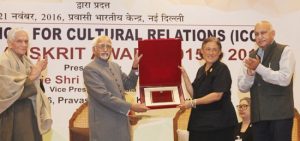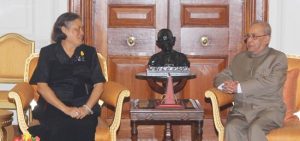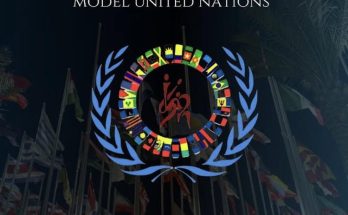 It was a time for Indo-Thai cultural bonding. Sanskrit and sanskriti (culture) blended beautifully as Thailand’s Princess Maha Chakri Sirindhorn was conferred the first World Sanskrit Award in the Indian capital on November 21.
It was a time for Indo-Thai cultural bonding. Sanskrit and sanskriti (culture) blended beautifully as Thailand’s Princess Maha Chakri Sirindhorn was conferred the first World Sanskrit Award in the Indian capital on November 21.
“The Thai language is very different from Sanskrit. But culturally it’s very similar,” the Thai princess said after receiving the first Sanskrit award instituted by the Indian Council for Cultural Relations (ICCR). It’s a great honour to receive it from the Vice President of the country. The award included US$ 20,000, a citation and a lapel pin.
Sirindhorn, fondly called by Thais as “Phra Thep” (“princess angel”), has emerged as a top contender for the crown in Thailand after the recent death of the country’s beloved monarch. A well-regarded scholar of Sanskrit, the 60-year-old Thai Princess has served as Royal Patron for the World Sanskrit Conference.
Prof. George Cardona, Professor Emeritus, University of Pennsylvania, received the World Sanskrit Award for 2016. Known for his formidable scholarship, Prof Cordona reads, writes and teaches through the Sanskrit medium.
 In his speech, Vice-President Hamid Ansari evoked the beauty and depth of the Sanskrit language in which many of India’s iconic religious and philosophical texts were written. “Sanskrit is important, and the corpus of scientific, philosophical, sacral, and poetic texts produced in this language is surely one of the richest, contributions to global textual culture ever,” said Mr Ansari. He underlined that that the shaping of Indian genius owes much to Sanskrit, not only in the fields of spirituality and religion but also in the fields of art, poetry, and literature as also of science, ethics, and systems of philosophy and knowledge. “Sanskrit encompasses one of the largest literatures of any language, and incorporates the sacred literature of three of the world’s major religions,” he said.
In his speech, Vice-President Hamid Ansari evoked the beauty and depth of the Sanskrit language in which many of India’s iconic religious and philosophical texts were written. “Sanskrit is important, and the corpus of scientific, philosophical, sacral, and poetic texts produced in this language is surely one of the richest, contributions to global textual culture ever,” said Mr Ansari. He underlined that that the shaping of Indian genius owes much to Sanskrit, not only in the fields of spirituality and religion but also in the fields of art, poetry, and literature as also of science, ethics, and systems of philosophy and knowledge. “Sanskrit encompasses one of the largest literatures of any language, and incorporates the sacred literature of three of the world’s major religions,” he said.
Minister of State for External Affairs M.J. Akbar underscored the effortless spread of Sanskrit to foreign countries over the years, and cited it as an example of India’s soft power. “Sanskrit did not travel with arms and is the first true evidence of what we today call soft power,” he said.
Thailand is one of India’s key partners in the ASEAN region. The cultural connections between the two countries, exemplified in the Thai princess’ passionate love for Sanskrit, are set to complement the burgeoning business and strategic ties. In recent years, culture has acquired greater salience in India’s Act East Policy, which seeks to add greater depth to New Delhi’s blossoming relations with this dynamic and vibrant region.
Author Profile
Latest entries
 India and the WorldAugust 25, 2019Amid Pakistan’s Kashmir fury, UAE, Bahrain fete Modi with top civilian honours
India and the WorldAugust 25, 2019Amid Pakistan’s Kashmir fury, UAE, Bahrain fete Modi with top civilian honours India and the WorldAugust 15, 2019India@72: Modi unveils Rs100-trillion infrastructure upgrade for $5 trillion economy
India and the WorldAugust 15, 2019India@72: Modi unveils Rs100-trillion infrastructure upgrade for $5 trillion economy India and the WorldJuly 22, 2019Chandrayaan-2 launch: India’s Moon dreams soar high
India and the WorldJuly 22, 2019Chandrayaan-2 launch: India’s Moon dreams soar high India and the WorldFebruary 20, 2019Saudi Arabia bets on $100 billion India opportunity, backs terror concerns
India and the WorldFebruary 20, 2019Saudi Arabia bets on $100 billion India opportunity, backs terror concerns







